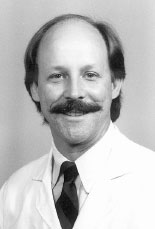Dr. Mark S. George
The Medical News Today article Brain Magnetizer Approved For Treatment-Resistant Depression said
“The US Food and Drug Administration (FDA) gave the green light earlier this month for a new non-invasive treatment for depression that relies on a magnetic device to stimulate the brain by sending magnetic pulses through the skull.Intended for patients whose depression is not responding to anti-depressants, the new therapy, called transcranial magnetic stimulation or TMS, is said to have none of the risks of other interventions such as surgically implanted electrodes and electric shock therapy.
The TMS device was developed by Neuronetics Inc of Malvern, Pennsylvania, and is called NeuroStar. It started out as a research project at the Medical University of South Carolina (MUSC) who describe it as the first and only such device to be cleared by the FDA for the treatment of severe depression.
Dr Mark George, who is based at MUSC and pioneered, with others, on the use of TMS to treat depression, said developments like TMS are ‘opening up a whole new area of medicine’.
‘There’s a whole field now that’s moving forward of noninvasive electrical stimulation of the brain,’ said George.”
Mark S. George, MD is Distinguished Professor of Psychiatry, Radiology and Neurosciences; Director, MUSC Center for Advanced Imaging Research (CAIR); Director, Brain Stimulation Laboratory (BSL); MUSC Director, SC Brain Imaging Center of Excellence (BICOE); and Chairman, NIMH Optimization of TMS for the Treament of Depression Study (OPT-TMS). He is Editor-in-Chief of Brain Stimulation and is on the Editorial Board of CNS Spectrums: The International Journal of Neuropsychiatric Medicine.
His research interests include:
- Diseases: major depression, bipolar disorder, anxiety disorders (particularly OCD), tourettes syndrome, and chronic pain.
- General Research: new treatment development, brain basis of emotion regulation, sleep deprivation, and neuropsychiatry.
- Techniques: neuroimaging (particularly fMRI and PET), brain stimulation, vagus nerve stimulation (VNS), transcranial magnetic stimulation (TMS), deep brain stimulation (DBS), and electroconvulsive therapy (ECT).
Mark coauthored Brain Stimulation Therapies for the Clinician, The Neuroscience of Clinical Psychiatry: The Pathophysiology of Behavior and Mental Illness, and Neuroactivation and Neuroimaging With Spet, and coedited Transcranial Magnetic Stimulation in Clinical Psychiatry and Transcranial Magnetic Stimulation in Neuropsychiatry.
His patents include Methods and systems for using transcranial magnetic stimulation and functional brain mapping for examining cortical sensitivity, brain communication, and effects of medication, Functional magnetic resonance imaging guided transcranial magnetic stimulation deception inhibitor, Methods and systems for using transcranial magnetic stimulation to enhance cognitive performance, Method, apparatus and system for determining effects and optimizing parameters of vagus nerve stimulation, and Systems and methods for detecting deception by measuring brain activity.
Mark earned his B.A. in Philosophy (cum laude) at Davidson College, Davidson, North Carolina in 1980. He earned his M.D. at the Medical University of South Carolina (MUSC), Charleston, South Carolina in 1985.
